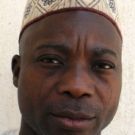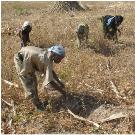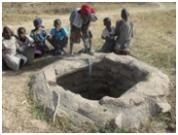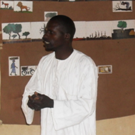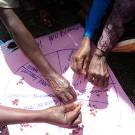| Student Grant Award | CSDi student Martin Sishekanu wins grant award for course project |
 |
Martin Sishekanu (Zambia) and course partner Ursula Flossmann-Kraus (Germany/Philippines) have just completed the third course of the four course diploma program on Community-Based Adaptation To Climate Change. Students develop documents in the courses which are suitable for presentation to donors—and Martin just got the good news that he has received a grant award for an agricultural income generation component of their project. Congratulations Martin!
Follow link to downlioad the outline of the project which they have developed.
|
- An Agricultural Income Generation Program
- An Animal Husbandry Program
- A Land-Use Management Plan
- A Climate Smart Agricultural Practices Program
| Rio+20 | Community based adaptation will kick-start a green economy for the world’s poor |
 |
Community-based adaptation to climate change offers sustainable solutions to our future’s green entrepreneurs: hundreds of millions of smallholder farmers.
What adaptation to climate change activities are available for use today? There is confusion over what adaptation activities are. Many people are expecting a palette of brand-new technologies to begin arriving any day now: adaptation silver bullets.
Community based adaptation (CBA) is a cross-cutting initiative that integrates adaptation, environmental restoration, mitigation, and disaster risk reduction—and includes these participatory approaches to sustainable development and poverty reduction. Read more:
|
| June Field Guide | Family Gardens for Food Security and Nutrition |
 |
For many people living in the cycle of poverty, the idea of starting a kitchen garden might seem overwhelming. It could be the time investment, it might be perceived costs. It might be a lack of know-how: what to plant, how to plant and how to care for a garden. However, the positive benefits make it worthwhile enabling community members in gardening for nutrition.
Start small, think simple. The purpose of the first year’s garden is to give the participants a win—so that they will be encouraged to plant again the following year. Even if they plant only one bed, 1 meter by 4 meters, they should be able to get positive, delicious, nutritious results. Follow the link to download the field guide and how-to card. |
| Project of the Month | Martha Njoroge’s home garden program for HIV+ children in Kenya |
 |
Martha works with the Wamumbi Orphan Care as a Project Manager organizing events for the orphaned children they support. Martha has partnered with Kathy Tate-Bradish (US) and Genevieve Lamond (UK). Follow the link to see field reports and photos.Martha, Kathy and Genevieve have developed a project which includes these programs:
|
| News from the Field |
CSDi students face critical danger in the communities where they work |
 |
Suleiman Barau Kadana works for People Oriented Development of ECWA as a facilitator and training officer in northern Nigeria. Sule is just finishing his second course at CSDi—he has one more assignment to turn in and he has just written:
“Regarding my week 6 assignment—due to tension in Northern Nigeria I am unable to get it done.” The Boko Haram bombed 3 Christian churches in his town on the 17th—50 people died
I’m impressed that field staff working under dangerous conditions and taking our courses continue to develop their projects, send in reports & assignments—and sign up for new courses. |
| CSDi News |
CSDi is Growing! | iLearning | Facebook | Dev Community| Newsletter | Free Resource Membership |
 |
Growth at the Center has been spectacular thanks to you. I’m writing to tell you about a few of our achievements & to show you a few simple ways that you can help us grow more.
|
| June Project Resource |
50 Solution-Oriented Program Templates for Challenges in Relief, Development & Adapatation |
|
Here are a range of solutions in the form of programs and activities that past students have used successfully in addressing project challenges. Feel free to use them, modify them, or develop your own solutions instead. Many of the programs are highly specific to one student’s project and will need to be adapted to fit yours. Many of the programs have multiple activities; these are to give you options for customizing your own programs: edit the activities down as you see fit for your project. Also, be sure to visit:
1. Community-Based Adaptation: 300 Hands-On Field Activities. 2. Student Countries and Project Challenges. |
Learn more about design and implementing CBA projects.


